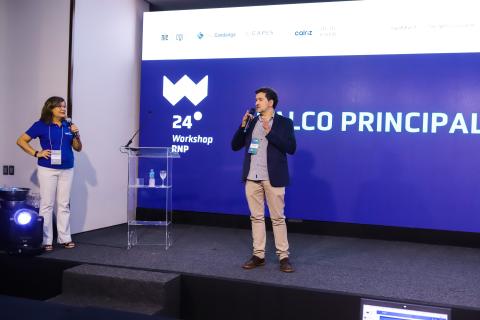OpenRAN@Brasil kicks off WRNP 2023
OpenRAN@Brasil was the opening theme of the 24th WRNP. Launched by RNP in partnership with the Center for Research and Development in Telecommunications (CPQD) two years ago, the program seeks to support the safe development of 5G technology, with high availability and performance, and to accelerate the use of open networks in the country. The panel was presented by José Ferreira Rezende, PhD in Computer Science, associate professor of the Systems and Computing Engineering Program at UFRJ and advisor for Research, Development and Innovation (RD&I) at RNP.
Rezende highlighted that OpenRAN@Brasil is part of a global Open RAN movement. “The US is investing $1.5 billion in Open RAN. In Asia and Europe, everyone is also very involved in this initiative”, emphasized Rezende.
The main objectives of the program here in Brazil are to accelerate the development of the open and disaggregated networks ecosystem and to train network engineers, developers and researchers in the various technological domains. OpenRan@Brasil is divided into three phases, expected to take place in up to five years. “The first two phases are already underway. We are preparing phase three, scheduled to start in 2024”, explained Rezende.
Phase 1, started last year, foresees, for example, the construction of a testbed in Campinas and Rio de Janeiro and a public call directed to academia for the development of testbed components. Phase 2, which is currently running, aims to develop a 5G radio unit and assess the program's cyber risk, among others.
Rezende explained that the development of the radio unit needs to comply with the O-RAN Alliance, a global community with hundreds of operators, suppliers and research institutions, responsible for defining the specifications for all Open RAN components and their interfaces.
In addition, the 5G radio unit that is being developed needs to have a degree of programmability and flexibility, a national market niche and allow innovation in the use of artificial intelligence and machine learning. “What we want at the end of the second phase is the search for partners in the national industry to manufacture this radio unit”, explained Rezende.
RNP's RD&I advisor also pointed out the difficulty of having specialized labor to work with these new technologies. “Researchers discuss a lot the profile that is required to work in this area. We need people who understand not only the system and software, but also the whole telecommunications part. This niche requires knowledge of signal processing and software optimization. There are many challenges, even to find people with this dual profile, but I believe that we will quickly be able to close this gap in training people”.

Foto: Eduardo Tadeu / Divulgação RNP
OpenRAN@Brasil was the opening theme of the 24th WRNP. Launched by RNP in partnership with the Center for Research and Development in Telecommunications (CPQD) two years ago, the program seeks to support the safe development of 5G technology, with high availability and performance, and to accelerate the use of open networks in the country. The panel was presented by José Ferreira Rezende, PhD in Computer Science, associate professor of the Systems and Computing Engineering Program at UFRJ and advisor for Research, Development and Innovation (RD&I) at RNP.
Rezende highlighted that OpenRAN@Brasil is part of a global Open RAN movement. “The US is investing $1.5 billion in Open RAN. In Asia and Europe, everyone is also very involved in this initiative”, emphasized Rezende.
The main objectives of the program here in Brazil are to accelerate the development of the open and disaggregated networks ecosystem and to train network engineers, developers and researchers in the various technological domains. OpenRan@Brasil is divided into three phases, expected to take place in up to five years. “The first two phases are already underway. We are preparing phase three, scheduled to start in 2024”, explained Rezende.
Phase 1, started last year, foresees, for example, the construction of a testbed in Campinas and Rio de Janeiro and a public call directed to academia for the development of testbed components. Phase 2, which is currently running, aims to develop a 5G radio unit and assess the program's cyber risk, among others.
Rezende explained that the development of the radio unit needs to comply with the O-RAN Alliance, a global community with hundreds of operators, suppliers and research institutions, responsible for defining the specifications for all Open RAN components and their interfaces.
In addition, the 5G radio unit that is being developed needs to have a degree of programmability and flexibility, a national market niche and allow innovation in the use of artificial intelligence and machine learning. “What we want at the end of the second phase is the search for partners in the national industry to manufacture this radio unit”, explained Rezende.
RNP's RD&I advisor also pointed out the difficulty of having specialized labor to work with these new technologies. “Researchers discuss a lot the profile that is required to work in this area. We need people who understand not only the system and software, but also the whole telecommunications part. This niche requires knowledge of signal processing and software optimization. There are many challenges, even to find people with this dual profile, but I believe that we will quickly be able to close this gap in training people”.
